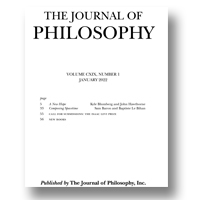|
1.
|
The Journal of Philosophy:
Volume >
118 >
Issue: 9
Matthew Vermaire
Against Schmought
abstract |
view |
rights & permissions
| cited by
Matti Eklund has argued that a new problem in metanormative theory arises when we consider the possibility of "normative counterparts"—normative concepts with the same normative roles as OUGHT and RIGHT (for instance), but with different extensions. I distinguish two versions of the problem, and propose a solution: when we attend to the attitudinal commitments involved in the possession and application of some normative concepts, we find that tolerance for the possibility of normative counterparts is rationally ruled out.
|
|
|
2.
|
The Journal of Philosophy:
Volume >
118 >
Issue: 9
Joe Horton
New and Improvable Lives
abstract |
view |
rights & permissions
| cited by
According to weak utilitarianism, at least when other things are equal, you should maximize the sum of well-being. This view has considerable explanatory power, but it also has two implications that seem to me implausible. First, it implies that, other things equal, it is wrong to harm yourself, or even to deny yourself benefits. Second, it implies that, other things equal, given the opportunity to create new happy people, it is wrong not to. These implications can be avoided by accepting a complaints-based alternative to weak utilitarianism. However, complaints-based views face two decisive problems, originally noticed by Jacob Ross. I here develop a view that avoids these problems while retaining the advantages of complaints-based views.
|
|
|
3.
|
The Journal of Philosophy:
Volume >
118 >
Issue: 9
Ben Bramble
The Defective Character Solution to the Non-identity Problem
abstract |
view |
rights & permissions
| cited by
The non-identity problem is that some actions seem morally wrong even though, by affecting future people’s identities, they are worse for nobody. In this paper, I further develop and defend a lesser-known solution to the problem, one according to which when such actions are wrong, it is not because of what they do or produce, but rather just because of why they were performed. In particular, I argue that the actions in non-identity cases are wrong just when and because they result from, or reflect in those who have performed them, a morally dubious character trait.
|
|





